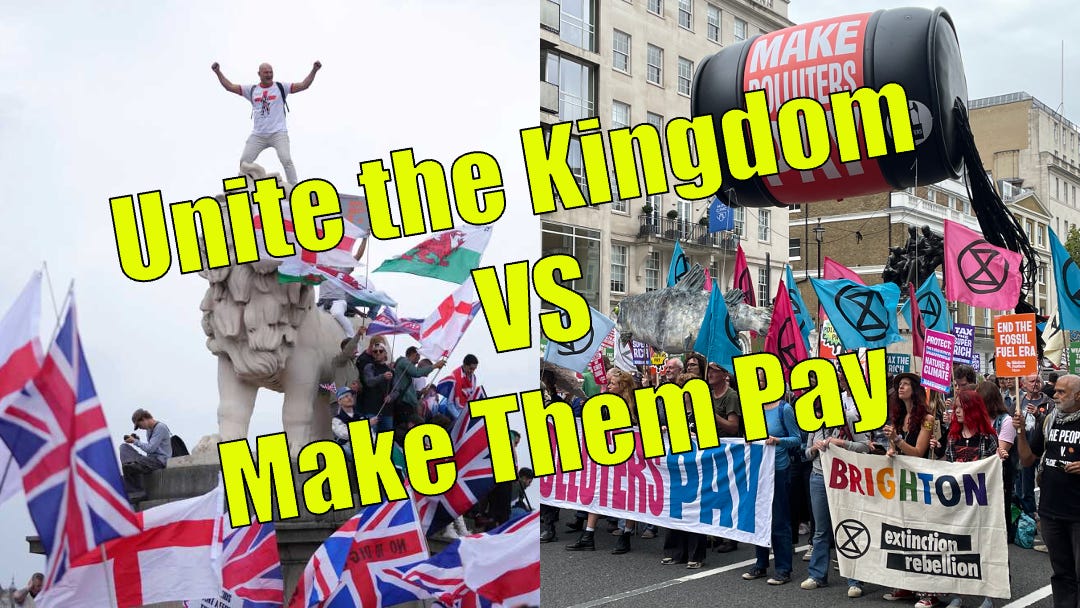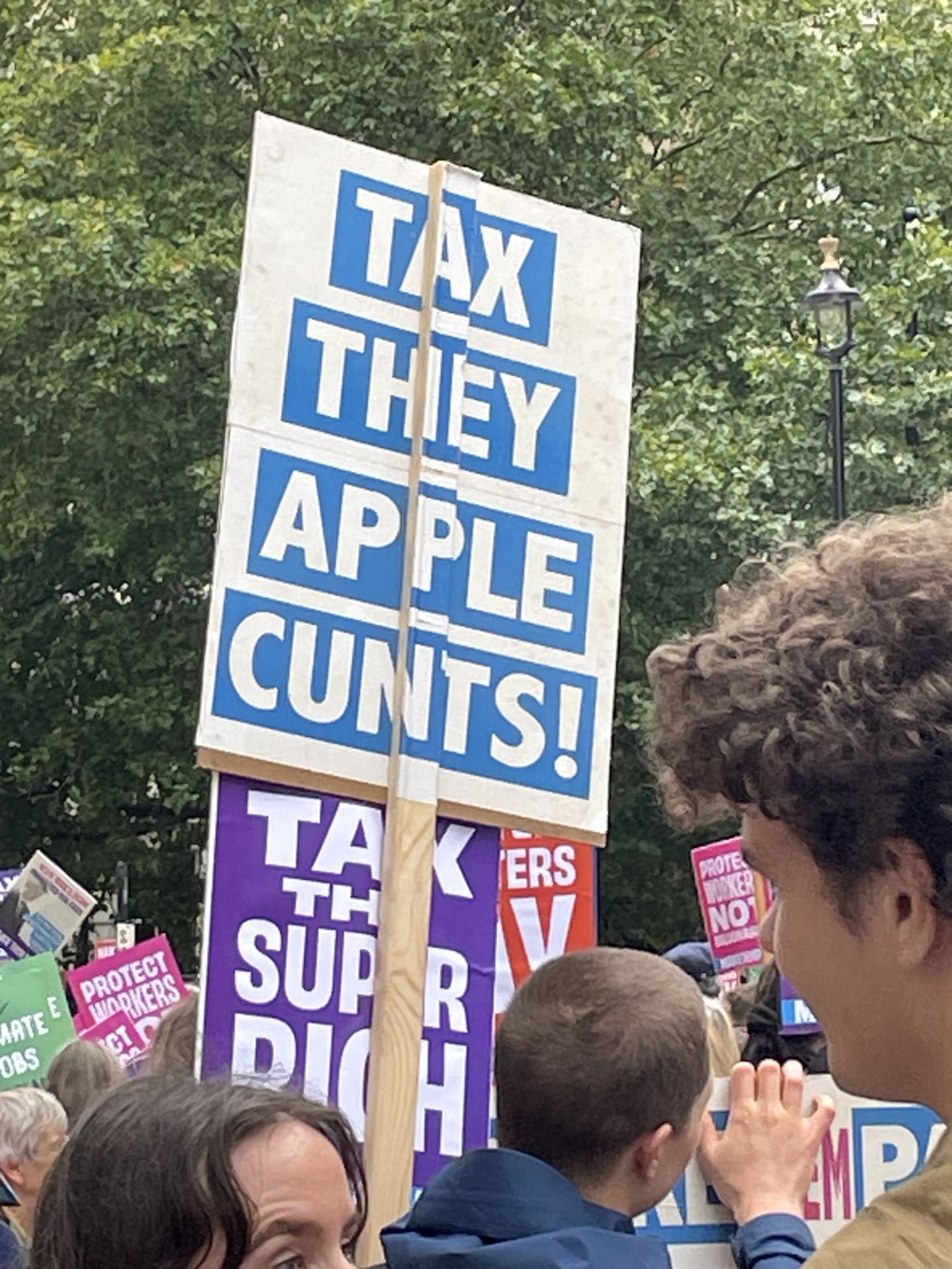Unite the Kingdom vs Make Them Pay—right roars, left snores ... but is there common ground?
Over the past two weekends, two very different groups have marched on the streets of London: is it possible for them to unite against the elites?
A walk with Unite the Kingdom
A week ago, while many were losing their minds with a severe case of Tommy Derangement Syndrome, I walked with Unite the Kingdom: not because I support them but because I wanted to understand them better. My intention was not to critique the undeniable inflammatory rhetoric of the organisers and people on the stage who sought to whip up the crowd, but to share my experience of the people in the crowd, which you can read about here.
In short, while it is true that I saw a lot of anti-immigrant flag-waving I also saw a lot of people who were justifiably dissatisfied with the political status quo due to having been left behind and generally shafted by the elites. It was easy to imagine that there was some common ground between them and the counter-protestors on the other side of the police cordon—on some issues, at least.
Also of note were the vast numbers—it is hard to believe the media suggestion of 150,000 attendees as it could easily have been far more. Those numbers were complemented by a tangible physicality that made the power of the state embodied in the police feel very symbolic indeed: if that crowd had wanted to “take over”, they could have done so with ease.
A walk with Make Them Pay
This week I walked the streets of London again, this time with Make Them Pay. Whereas Unite the Kingdom were ostensibly interested in “free speech” and stopping the boats, Make Them Pay have three demands: tax the super-rich; protect workers, not billionaires; and make polluters pay. The Make Them Pay agenda is very much up my street and that of Our Fair Future, but it was a disappointing experience indeed.
Despite the fact that this march had been advertised for some months and 88 organisations were listed on the website, the crowd numbers were very low. Before we set off—when everyone was most tightly bunched together—the crowd on Portland Place stretched from Duchess Street to All Souls’ Place: that’s a distance of 130 metres according to Google maps (I measured it on the ground as 160 paces): and that’s just occupying one side of the road.
I spoke to one pair of police and asked them if this was what they were expecting and they smirked and said, “well, you never know”. I spoke to another policeman who was a bit more forthcoming: “we were briefed this morning to expect up to 10,000”, he said looking around, “I guess we have about 10% of that”.
Hats off to all those people who attended, but it was not an impressive sight: a lot of pensioners, some students, some people giving it what they could on the chants: “One: we are the people. Two: we won’t be silenced. Three: tax the rich, now, now, now, now”; “They get rich, and we get poor. We won’t take it anymore”. The crowd marched down through Regents Street, across Oxford Circus, shoppers looking on slightly amused and confused. “Make who pay?” said one onlooker; “rubbish” said another. Unlike Unite the Kingdom, there was no sense this crowd could physically take over anything.
Shortly before Piccadilly Circus, I spotted a seat by a bus stop and decided to sit and watch the march go by. A marcher on rollerblades holding a sign denouncing Shell took a seat by me. I asked him what he thought of the attendance, and he said, “It’s fantastic! Not quite the 150,000 of last weekend, but still good”. “Really?”, I said, “there’s hardly anyone here?” I told him about the crowd being 160 paces long at the start and he didn’t believe me pointing to the length of the crowd threading down Regent Street. I reiterated that was what I counted at the beginning, at which point he started getting annoyed with me and skated off.
Can we unite?
The brutal truth is the scale and energy of the Make Them Pay march was utterly embarrassing in comparison to Unite the Kingdom: there simply is no comparison. But the three demands of Make Them Pay—tax the super-rich; protect workers, not billionaires; and make polluters pay—are just as relevant to those marching for Unite the Kingdom as those marching for Make Them Pay.
There is clearly something profoundly wrong with the way “the left” is communicating its message. While the Make Them Pay crowd may believe the Unite the Kingdom crowd is “the enemy” there is no doubt some common ground. The reality is the kind of people and numbers that comprised the Make Them Pay march are simply never going to have any impact unless they start scooping up large numbers of Unite the Kingdom supporters—and Reform voters, Daily Mail readers, GB News viewers, and all the others that are typically denounced by progressives as undesirables. I am not suggesting we should ignore racism and prejudice when it occurs, but I am suggesting that we need to find a way of coming together if we want to overthrow the elites and make this country better for everyone.
50 metres of Whitehall
As I left the final stage area of the Make Them Pay march, I thought back to the man on rollerblades and wondered whether the crowd had picked up loads of people along the way and that my initial estimate was indeed inaccurate, so made another mental map of who was there. The stage area and the whole crowd fitted comfortably—with room to spare—between the Cenotaph and the entrance to Downing Street, which Google Maps tells me is 50 metres of Whitehall. A sad state of affairs indeed.




